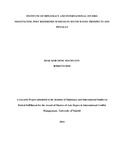| dc.description.abstract | The turbulent history of Sudan over the past two centuries has featured multiple wars
driven by exploitation and competition between states and sultanates, ill-documented largely
uncontrolled population movements in the hinterlands; sectarianism and religious movements
and control by powerful colonial interests. The aim of the study was examine the prospects and
pitfalls of Post Referendum negotiations in South Sudan and specific objectives being to: discuss
the post-referendum issues in South Sudan; investigate the pitfalls of post-referendum
negotiations between South Sudan and Sudan; and discuss the prospects of post-independence of
South Sudan. The study used external desk research technique. The study conducted a qualitative
data analysis method approach that was both theoretical and empirical in form. The study found
that borderline belt is an issue in South Sudan.Major border areas are in dispute. It found sharing of resources as another issue in South
Sudan. The resources the study found are oil & revenues and Nile waters. It found that both the
North and South Sudan depend heavily on independence alerted resource ownership, oil
revenues and current wealth-sharing arrangements. Another issue identified by the study is that
of Abyei. The study found that main part of the disputed area consists of a network of waterways
flowing into the Bahr el-Arab on its way through Kordofan into the Bahrel-Ghazal. Issue of
relations with international community is another issue. The United States continued to provide
humanitarian assistance to South Sudan and in finding a diplomatic solution to the North-South
Sudan conflict. It succeeded somewhat in its efforts as a result of the Comprehensive Peace
Agreement (CPA) in 2005 that called for a referendum in July 2011, in which the South opted
for independence. After South Sudan gained independence, the Obama administration promisedthat it will try to provide all possible support. In identification of the pitfalls of post-referendum
xii
negotiations between South Sudan and Sudan, the study found lack of inclusivity of interested
parties in southern Sudan, notably civil society and political parties, claimed to becomprehensive. The lack of inclusivity of the peace process means that the Sudanese people
could only pass judgment on the CPA through national elections, the elections were conducted
but the difficulties in demarcating the North-South border and ending the conflict in Darfur
resulted in a further postponement.
The study found that peace process never developed trust and understanding. This was
evident between the parties. It was also evident in the failure to commit to wide-ranging
reconciliation, in its absence and, the mediation followed Western practice and emphasized legal
requirements and time-tables. It found that the elitist approach of the mediation was also
manifest in its distain for the media. The study found that the second IGAD peace process
brought hope to South Sudan. The frustration with the lack of progress in the peace process ledto the growing US interest in Sudan. As a result of the increasing profile of Sudan’s civil war in
domestic politics and its perceived link to American security, and the rejuvenation of the peace
process were linked and provided the stimulus for the second and successful IGAD peace
initiative. The study found that Government of South Sudan (GoSS) leaders should seize this
rare opportunity to tackle challenges facing citizenry by inventing in sectors that would bolster
the country’s economy like the agriculture. The study recommends that the South Sudan and
North Sudan must continue negotiations. It is in the best interest of the two nations to maintain
peace and establish mutually beneficial interactions. The divorce was inevitable but so is the
need for continuous engagement. | en_US |

